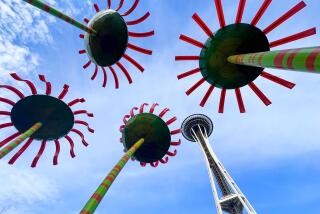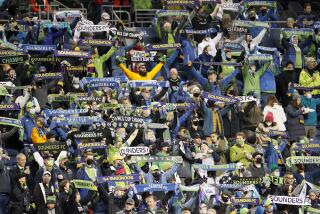This big city would rather think small
SEATTLE — For believers in a Lesser Seattle, it’s been a fantastic month.
First, Seattle voters said a resounding “no” to spending public money on a new professional basketball arena, all but begging the NBA SuperSonics to leave town. Strong opposition has also emerged to the mayor’s plans for a Big Dig-style tunnel project along the waterfront.
And, in a capstone, the National Weather Service announced last week that November, far from over, was already the rainiest month here in nearly 75 years.
Wonderful, from the Lesser Seattle point of view. Let the word go out. Who’d ever want to live here?
“Lesser Seattle” was a term coined in the 1980s by late newspaper columnist Emmett Watson, as a puckish play on Greater Seattle Inc., the name of an early group of tourism and growth promoters. It never became a formal organization, but Lesser Seattle is nonetheless a powerful and enduring state of mind.
These Seattle residents pine for the good old days, when nobody thought of Seattle as a world-class city -- and, not coincidentally, when an average worker could afford a house here. The city, in their view, had no business hosting the now-infamous World Trade Organization meeting here in 1999, but nonetheless did itself proud by turning the event into a huge anti-globalization protest.
And Seattle, they say, can take or leave the mantle of being an NBA city.
“Seattle doesn’t need to have a pro basketball team in order to feel special,” says Chris Van Dyk, a co-founder of Citizens for More Important Things, a nonprofit group that won the anti-subsidy vote Nov. 7. “Seattle is special regardless.”
Plenty of people welcome growth and development. But plenty say Seattle has given up too much of its blue-collar soul in the process.
“Part of our civic makeup is this idea that being too big for your britches is a bad thing,” says Knute Berger, former editor of the Seattle Weekly newspaper. “In that sense, Lesser Seattle is due for a resurgence.”
Al Runte, a former University of Washington history professor and former mayoral candidate, says he detects an “enough is enough” sentiment among voters in their passage, by nearly 75%, of the initiative barring public funds for a new basketball arena.
“A city of this quality does not need to give incentives to developers,” he says. “They should be paying taxpayers for the privilege of being in this city.”
Once, the Seattle area seemed quietly tucked away in a corner of the map; now, of course, it’s the headquarters of Microsoft, Starbucks and Amazon.com, and it remains a magnet for global talent.
City Councilman Nick Licata, a leader of both the anti-subsidies and anti-tunnel forces, says Watson’s spirit is alive and well, though Licata wouldn’t quite adopt Lesser Seattle as his own slogan.
“I knew Emmett; I certainly understood his concept in a visceral way,” says Licata. “It’s dangerous for any public official to say you’re in favor of Lesser Seattle. It sounds like you’re a Luddite. But there’s an element of Lesser Seattle that everyone identifies with. It’s more neighborhood-oriented. Less glitz, more substance.”
Seattle is hardly the only place where the visions of preservationists clash with those of growth promoters. Yet even as Seattle has become known around the world for exporting software, coffee and jet airplanes, the Lesser Seattle mentality remains an important civic force.
In another battle unfolding, Mayor Greg Nickels has proposed replacing the aging Alaskan Way Viaduct, a highway that some say cuts like a scar along the Seattle waterfront, with a tunnel.
Nickels says removing the viaduct would connect the waterfront to downtown and “transform the front door of our city into a spectacular public gathering place for generations to come.” The problem: That option could cost $2 billion to $3 billion more than the roughly $2.5 billion needed to rebuild the road.
The battle may ultimately come before voters in a referendum.
State House Speaker Frank Chopp (D-Seattle) sent a letter Nov. 16 to Gov. Chris Gregoire urging her to help scrap the tunnel plan.
“An aboveground solution is the only viable option,” said the letter, also signed by 29 of Chopp’s colleagues. “Simply put, the tunnel is a luxury the taxpayers of Washington cannot afford.”
Similar sentiment seemed to be at work in the vote on an arena for the Sonics, which Starbucks Chairman Howard Schultz sold this year for $350 million to an Oklahoma City-based partnership.
The group has said it wants to remain in the Seattle area and may consider building an arena in the suburbs, but many glum fans think the franchise is ultimately headed to Oklahoma.
The Sonics may not leave. They’re obligated under their lease to play at KeyArena here through 2010, and a lot could happen between now and then to make the public more kindly disposed toward the idea of a new arena.
Van Dyk, the co-chair of Citizens for More Important Things, which is funded in part by a union of state healthcare workers, says neither the city nor the state should be giving “handouts” to professional sports franchises.
Instead, he says, they should be spending more on “affordable healthcare,” schools, and salaries for teachers, firefighters, police officers and other public employees. He says he takes inspiration from columnist Watson’s Lesser Seattle crusade.
“Emmett had a certain disdain for the chamber-ofcommerce types who will spend money mindlessly on things like ‘SayWA’ or ‘Metronatural’ ” -- tourism slogans for the state and city, respectively.
On the other hand, Van Dyk says with a chuckle, the attributes of Lesser Seattle have a lot to do with why people want to move here.
“It’s ironic,” he says. “Emmett generated a ton of publicity for Seattle by theoretically downplaying it.”
sam.howe.verhovek@ latimes.com
More to Read
Sign up for Essential California
The most important California stories and recommendations in your inbox every morning.
You may occasionally receive promotional content from the Los Angeles Times.










